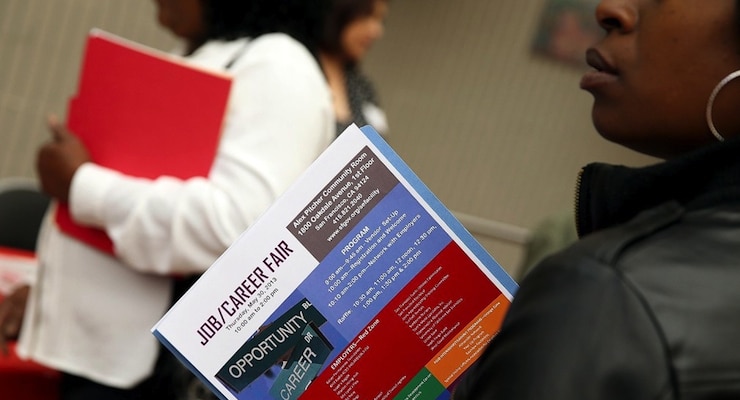

SAN FRANCISCO, CA – MAY 30: A job seeker holds a pamphlet during a job and career fair at City College of San Francisco southeast campus on May 30, 2013 in San Francisco, California. Hundreds of job seekers attended a career fair hosted by the San Francisco Southeast Community Facility Commission. (Photo by Justin Sullivan/Getty Images)
The February jobs report released by the Labor Department Friday painted a very mixed picture of the U.S. labor market. While the U.S. economy added 242,000 jobs in February, which was above the median forecast for 190,000 job, already anemic wages actually declined.
The unemployment rate met expectations by remaining flat at 4.9% and the labor force participation rate rose to 62.9% from 62.7%. The average workweek for all employees on private nonfarm payrolls declined by 0.2 hour to 34.4 hours in February.
However, In February, average hourly earnings for all employees on private nonfarm payrolls declined by 3 cents to $25.35. The development is disappointing particularly after wages increased 12 cents in January and, now factoring in the latest data, average hourly earnings rose by just 2.2% over the year. In February, average hourly earnings of private-sector production and nonsupervisory employees were unchanged at $21.32.
Theoretically, wages should increase as the labor market tightens, as employers use income to compete with other employers to attract more workers. But that hasn’t happened. The reason wages haven’t risen is simple, yet two-fold. The jobs that are being created are primarily low-paying, low-skilled service sector jobs that don’t pay much.
Further, survey after survey shows the economy and shifted to a part-time animal as many employers adjust their hiring behavior to avoid ObamaCare thresholds. A report from the Congressional Budget Office concluded the president’s signature health care law would cost more than 2 million full-time jobs.
Employment in other major industries, including manufacturing, wholesale trade, transportation and warehousing, financial activities, professional and business services, and government, showed little change over the month.
Manufacturing, for instance, continues to decline regionally and nationwide, remaining in contraction for much of the latter half of 2015 and first quarter of 2016. The February jobs report showed manufacturing workweek was unchanged at 40.8 hours, and factory overtime was 3.3 hours for the third month in a row. The average workweek for production and nonsupervisory employees on private nonfarm payrolls edged down by 0.1 hour to 33.7 hours.
The Institute for Supply Management reported this week that their gauge of nationwide manufacturing activity contracted for the fifth straight month. The service sector, however, also cooled in February, though it remains in contraction.
The most damning journalistic sin committed by the media during the era of Russia collusion…
The first ecological study finds mask mandates were not effective at slowing the spread of…
On "What Are the Odds?" Monday, Robert Barnes and Rich Baris note how big tech…
On "What Are the Odds?" Monday, Robert Barnes and Rich Baris discuss why America First…
Personal income fell $1,516.6 billion (7.1%) in February, roughly the consensus forecast, while consumer spending…
Research finds those previously infected by or vaccinated against SARS-CoV-2 are not at risk of…
This website uses cookies.